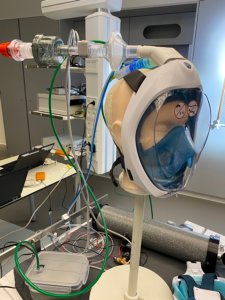Researchers at the University of Twente have been hard at work this past week to design and test a new type of ventilator mask. This full face mask, based in part on an Italian example, can be used in the treatment of approximately 20 to 30 per cent of corona patients in hospitals. The models being tested by the team include diving masks sold by sports and outdoor retailer Decathlon. For those masks, a 3D-printed connector has been made to allow the tube of a ventilation machine to be inserted instead of a snorkel.
Adapting these masks can help ease the pressure on intensive care units by postponing the transfer from a regular hospital ward to the ICU. The design is already being used in France and expansion to other countries can quickly follow.
Soon after the corona outbreak, pulmonary physiologist Prof. Frans de Jongh, Professor of Health Technology Implementation Ruud Verdaasdonk (both of the University of Twente’s TechMed Centre), and Prof. Stefano Stramigioli and Dr Vincent Groenhuis (both robotics experts) joined forces in search of medical solutions. “We received a direct request for help from IRCAD/IHU, a partner university in the French city of Strasbourg, with which we have a close working relationship,” Stefano Stramigioli explains. “In Italy and Spain you can already see images of corona patients wearing tight-fitting masks that cover the face and head. These are connected to a tube that supplies air with an increased concentration of oxygen. In addition, the output is fitted with a virus filter and a pressure relief valve. Air can only leave the mask when the patient breathes hard enough, requiring them to make an additional effort when they exhale. This creates a higher pressure that causes the lungs to open up more and allow in more oxygen. This method of non-invasive ventilation has been around for a long time, but these days hardly any suitable products are still available. Another major advantage of our method is that the mask fits tightly over the head. This creates a closed circuit and reduces the risk of contamination in the patient’s environment.”

Decathlon diving masks
As with breathing apparatus, these masks are also in very short supply in hospitals. In a remarkably short time, Timon Fabius and Xenia Hoppenbrouwer, researchers at the University of Twente and Medisch Spectrum Twente, have tested which adapters fit specific masks. This even includes diving masks sold by sports and outdoor retailer Decathlon. These not only meet the main criteria but are also inexpensive and still readily available.
Straight to Strasbourg
On a website built by Stramigioli http://help4corona.eu/, the University of Twente researchers have made all of their designs and instructions available to medical specialists. Here they can find all they need to know about how to use the method. The first patients were treated in Strasbourg this week, and the initial results are encouraging. “We bought a new 3D printer on campus and once we had printed the parts, a courier drove them straight to Strasbourg,” Stramigioli continues. “There they were put to work immediately.”
For patients with milder symptoms
The tested method can be used to treat corona patients in the phase before they have to be admitted to hospital with breathing problems and intubated in an Intensive Care unit. The same method is being used in Italy for patients able to survive without mechanical ventilation, patients with a relatively good level of physical fitness and patients who are nearing the end of treatment having undergone mechanical ventilation. This equates to between 20% and 30% of corona patients, according to estimates made by Italian hospitals.
Application in the Netherlands?
The TechMed Centre is currently involved in the preparations to use this method in corona care in the Netherlands. Additional measurements and analyses are now being carried out at the University of Twente in the interests of safety and efficacy. The team is working with hospitals to test effectiveness in the treatment of corona patients. Intensive talks are already under way with the business community and teams from the Ministry of Economic Affairs, Agriculture and Innovation and the Ministry of Health, Welfare and Sport to make the concept available to Dutch hospitals in the short term.
The TechMed Centre at the University of Twente is working hard to fight the corona crisis. An overview of all of the initiatives taken in recent weeks can be found here: https://www.utwente.nl/en/techmed/about/fighting-corona-crisis/





